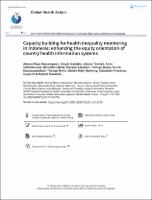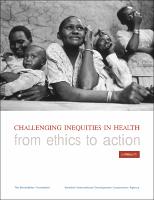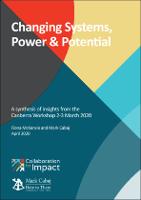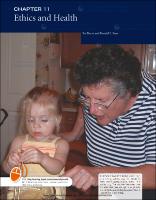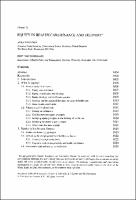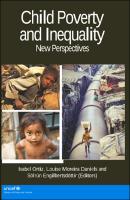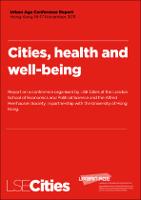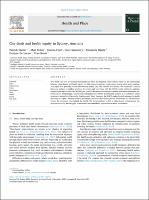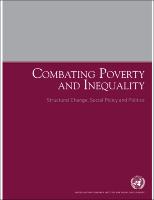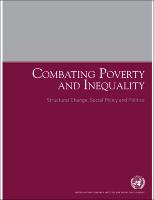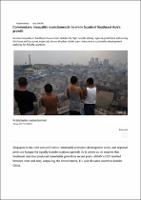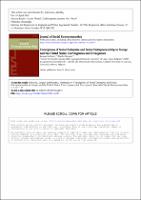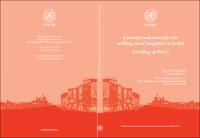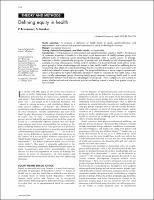Browsing by Title
Now showing items 43-62 of 229
-
Capacity building for health inequality monitoring in Indonesia: enhancing the equity orientation of country health information systems
(2018)
Background: Inequalities in health represent a major problem in many countries, including Indonesia. Addressing health inequality is a central component of the Sustainable Development Goals and a priority of the World Health Organization (WHO). WHO provides technical support for health inequality monitoring among its member states. Following a capacity-building workshop in the WHO South-East Asia Region in 2014, Indonesia expressed interest in incorporating healthinequality monitoring into its national health information system. Objectives: This ... -
Celebrating ASEAN: 50 years of evolution and progress
(The ASEAN Secretariat, 2017)
A statistical publication released on the occasion of the 50th anniversary of the signing of the Declaration establishing the Association of Southeast Asian Nations (ASEAN). Since its foundation in 1967, ASEAN has made extraordinary progress in preserving peace and security, promoting economic co-operation and integration as well as social development. This publication presents a collection of statistical indicators from ASEANstats’ databases, and highlights the main findings observed to showcase the evolution and progress of ASEAN over the past decades -
Challenging inequities in health : from ethics to action : summary
(Oxford University Press, New York, 2001)
Challenging Inequities in Health, was conceived as a response to the following: 1. Concerns about widening “health gaps” both between and within countries; 2. A disproportionate research focus on inequalities in health in the “North” to the relative neglect of the “South”; and 3. Inadequate analytic tools and pragmatic policies to redress health inequities. Through a collective effort of researchers and practitioners called the Global Health Equity Initiative (GHEI), a set of in-depth country studies and conceptual analyses on health equity ... -
Changing Systems, Power & Potential
(2020-03)
Mark Cabaj, President of the Canadian consulting company From Here to There and an Associate of Tamarack – An Institute for Community Engagement, worked with CFI to deliver a two-day workshop in March 2020 on Changing Systems, Power and Potential. CFI Network member Fiona McKenzie observed and synthesised the learnings, discussions and perspectives into a report which captures contributions from both presenters and participants. The result is a blend of concepts, frameworks, applications, hints and common threads that emerged about efforts to ... -
Chapter 11: Ethics and Health
(Community -focused nursing) -
Chapter 34 Equity in health care finance and delivery
(Handbook of Health Economics, 2000)
The paper surveys the economics literature on equity in health care financing and delivery. The focus is, for the most part, on empirical work, especially that involving intemational and temporal comparisons. There is, however, some discussion of the concept and definition of equity. The empirical sections cover the literature on equity in health care financing (progressivity and horizontal equity of health care financing arrangements), equity in health care delivery (horizontal equity in the sense of treating persons in equal need similarly), ... -
Child Poverty and Inequality: New Perspectives
(2012)
The 21st century starts with vast inequalities for children in terms of income, access to food, water, health, education, housing, or employment for their families. Half of the world’s children are below the poverty line of $2 a day and suffer from multiple deprivations and violations to basic human rights. More than 22,000 children die each day, and most of their deaths are preventable. This volume presents some of the critical acknowledged voices to move a necessary agenda forward. It explains multidimensional poverty measurements, describes ... -
Cities, health and well-being
(2012)
Cities are critical sites for enquiry and action in relation to health and well-being. With up to 70 per cent of the world’s population estimated to be living in urban areas by 2050, global health will be determined increasingly in cities. In response to these challenges, the 2011 Urban Age Hong Kong conference, organized by the London School of Economics and Political Science and the Alfred Herrhausen Society in partnership with the University of Hong Kong, brought together over 170 planners, architects, sociologists, medical doctors, public ... -
City deals and health equity in Sydney, Australia
(2022-01)
City Deals’ are new governance instruments for urban development. Vast evidence exists on the relationship between urban factors and health equity, but little research applies a health equity lens to urban policy-making. This paper does precisely that for the Western Sydney City Deal (WSCD) in Australia. We conducted a critical discourse analysis of publicly available documents and interviews with the WSCD’s main architects, applying insights from relevant theories. We find ‘pro-growth’ discourse to encourage economic investment dominates any ... -
Closing the health equity gap: policy options and opportunities for action
(World Health Organization, 2013)
This report, which highlights policy options for consideration within national discussions, was developed in conjunction with WHO regional offices and others across the Organization who are working on the social determinants of health and equity issues. The general approach to the report was discussed at a seminar within WHO’s Information, Evidence and Policy cluster and with WHO regional advisors following the release of the final report of the Commission on Social Determinants of Health in August 2008. In January 2009 the 124th session of the ... -
Combating poverty and inequality: structural change, social policy and politics
(United Nations Research Institute for Social Development, 2010)
Poverty reduction is a central feature of the international development agenda and contemporary poverty reduction strategies increasingly focus on “targeting the poor”, yet poverty and inequality remain intractable foes. Combating Poverty and Inequality argues that this is because many current approaches to reducing poverty and inequality fail to consider key institutional, policy and political dimensions that may be both causes of poverty and inequality, and obstacles to their reduction. Moreover, when a substantial proportion of a country’s ... -
Combating poverty and inequality: structural change, social policy and politics
(United Nations Research Institute for Social Development, 2010)
Poverty reduction is a central feature of the international development agenda and contemporary poverty reduction strategies increasingly focus on “targeting the poor”, yet poverty and inequality remain intractable foes. Combating Poverty and Inequality argues that this is because many current approaches to reducing poverty and inequality fail to consider key institutional, policy and political dimensions that may be both causes of poverty and inequality, and obstacles to their reduction. Moreover, when a substantial proportion of a country’s ... -
Commentary: Inequality looms beneath the shiny facade of Southeast Asia's growth
(CNA, 2017-04-23) -
Conceptions of Social Enterprise and Social Entrepreneurship in Europe and the United States: Convergences and Divergences
(Journal of Social Entrepreneurship, 2010)
The concepts of social enterprise and social entrepreneurship are making amazing breakthroughs in EU countries and the United States. Until recently, the debates on both sides of the Atlantic have taken place in parallel trajectories with few connections among them. In the first part of the paper, we describe the European and US historical landscapes in which those concepts took root. In the second part, we analyse how the various conceptualizations have evolved. This analysis paves the way for the third part, in which we highlight the conceptual ... -
Costa Ricans Live Longer Than Us. What’s the Secret?
(2021-08-30) -
Deconstructing development discourse: buzzwords and fuzzwords
(Practical Action Pub. ; Oxfam, 2010)
"Writing from diverse locations, contributors critically examine some of the key terms in current development discourse. Why should language matter to those who are doing development? Surely, there are more urgent things to do than sit around mulling over semantics? But language does matter. Whether emptied of their original meaning, essentially vacuous, or hotly contested, the language of development not only shapes our imagined worlds, but also justifies interventions in real people's lives. If development buzzwords conceal ideological differences ... -
Defining equity in health
(Journal of Epidemiology & Community Health, 2003)
Study objective: To propose a definition of health equity to guide operationalisation and measurement, and to discuss the practical importance of clarity in defining this concept. Design: Conceptual discussion. Setting, Patients/Participants, and Main results: not applicable. Conclusions: For the purposes of measurement and operationalisation, equity in health is the absence of systematic disparities in health (or in the major social determinants of health) between groups with different levels of underlying social advantage/disadvantage—that ... -
Demystifying rising inequality in Asia
(Asian Development Bank Institute, 2019)
Income inequality is one of the most profound social, economic, and political challenges of our time. The gap between the rich and the poor has been regarded as a major concern for policy makers. This gap is at its highest level in decades for developed economies, while the inequality trend has been rising in many developing countries. In Asia, despite recent economic growth, income distribution has been worsening as well. This book contributes to the existing literature on inequality in Asia by overviewing the new trend of inequality in Asia and ... -
Demystifying rising inequality in Asia
(Asian Development Bank Institute, 2019)
Income inequality is one of the most profound social, economic, and political challenges of our time. The gap between the rich and the poor has been regarded as a major concern for policy makers. This gap is at its highest level in decades for developed economies, while the inequality trend has been rising in many developing countries. In Asia, despite recent economic growth, income distribution has been worsening as well. This book contributes to the existing literature on inequality in Asia by overviewing the new trend of inequality in Asia and ...

